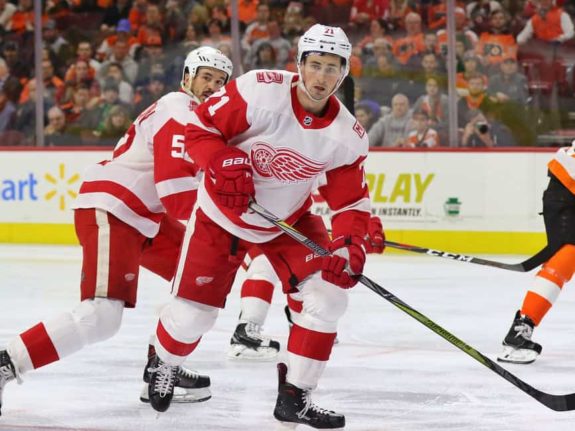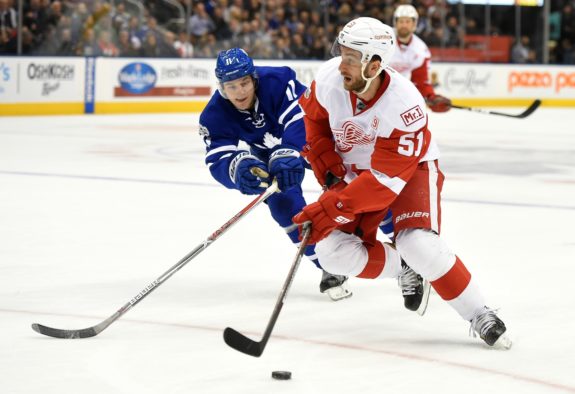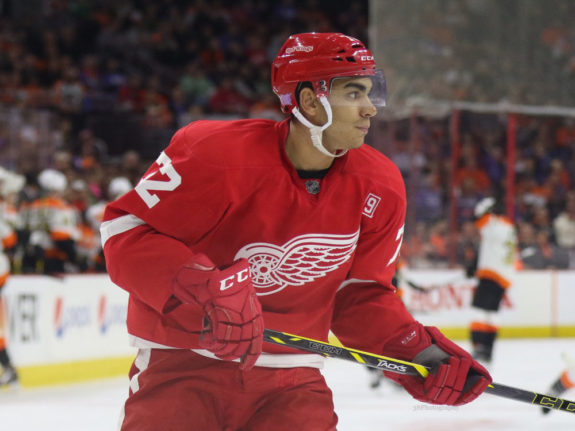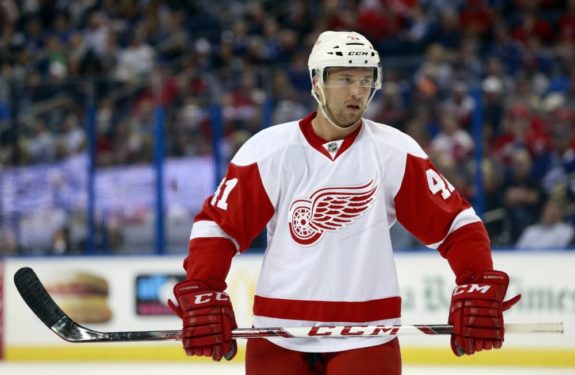What’s The Grind Line? Apart from the once-famous line of Kris Draper, Kirk Maltby, and either Joe Kocur or Darren McCarty, The Grind Line is also The Hockey Writers’ weekly column about the Detroit Red Wings. Jacob Messing, Tony Wolak and Rachel Anderson are the muckers who make up THW’s forechecking unit and sound off on Red Wings topics.
The Detroit Red Wings enter the 2018-19 season with question marks down the middle and a handful of natural centers in tow.
The loss of top line center Henrik Zetterberg will be significant, but Dylan Larkin showed promise in his third season and is the consensus heir to the top line.
After that, coach Jeff Blashill has already stated what he anticipates his centers to look like, but training camp battles and team chemistry could make for some fun changes entering the 2018-19 campaign.
This week, The Grind Line picks a center for each of the Red Wings’ four lines heading into training camp.
First Line Center
Jacob Messing (JM): Larkin
Larkin, 22, took a significant step forward in his third season by leading all Red Wings with 63 points (16 goals, 47 assists). He also led all forwards in time on ice, averaging 19:51 per game as Blashill’s go-to guy in all situations. He’s likely to become a bigger leader and likely break the 20-minute mark in 2018-19 as he remains the most potent offensive weapon heading into the season.

Tony Wolak (TW): Larkin
Armed with a new contract, Larkin is now the man in the city formerly known as Hockeytown. At five-on-five, the young franchise center was dangerous last season with 52 points, but will need to improve on his 13 even-strength tallies. The attribute that the Red Wings value most in Larkin, though, is his compete level – something the organization is hoping becomes contagious among his peers.
Rachel Anderson (RA): Larkin
As Jacob highlighted, Larkin dramatically improved during the 2017-18 season. Larkin proved early on in his Red Wings career, that he is a reliable and consistent skater. He’s grown in strength as well as on-ice execution. Already being a center position, there would be no learning curve as will perhaps a winger trying to fill the void.
Second Line Center
JM: Frans Nielsen
The Red Wings need more from Nielsen and allowing him to take over the second line could be a recipe for just that. A strong two-way player, Nielsen’s offense has taken a hit since signing with Detroit in 2016, partially due to a drop in ice time and lack of power play time. He should see more of the former this season as a reliable veteran.
TW: Nielsen
With experience playing second-fiddle to John Tavares on the Islanders, Nielsen should slot in well as the No. 2 center. While most organizations would prefer the veteran to center the third line, Nielsen will hold up his end of the bargain in Detroit with solid defensive play and 45-50 points overall.

RA: Tyler Bertuzzi
After an incredible rookie season with the Red Wings, and having the chance to skate alongside Zetterberg was a growing opportunity for him and he has proven to have the grit necessary to remain on a top line. He tallied 24 points in 48 games, which for a rookie campaign, is very successful. Bertuzzi would fill the center slot well but would need a second line opportunity to hone his skills a bit more.
Third Line Center
JM: Michael Rasmussen
While Blashill has already stated his anticipation for Andreas Athanasiou to take on this role, it may be better suited for Rasmussen. It would allow him to learn on the fly as an NHL center against weaker talent. It would also provide him the opportunity to play alongside a veteran like Thomas Vanek in a year of the Red Wings rebuild.
Related – The Grind Line: Red Wings’ Next Great Rookie
TW: Athanasiou
As Jacob mentioned above, Blashill wants Athanasiou to seize the No. 3 center role. And if he can be more effective in the faceoff circles, ‘AA’ will remain there, possibly with Vanek and Rasmussen flanking him. Those three could form a highly offensive line that Blashill could shelter with mostly offensive zone starts.

RA: Luke Glendening
Luke has consistently served as a fourth line center for the majority of the 2017-18 season. Having the best face-off percentage on the team, he’s a key offensive weapon to have at any time. Glendening also has become a master at “taking out the trash” in front of the net. Not afraid to get bumped around a bit, he’s got the grit to sit at center and produce an aggressive rush to the net. An upgrade to the third line is overdue and he’d be an excellent leader for any up-and-coming youths.
Fourth Line Center
JM: Glendening
Glendening on the fourth line is just as clear-cut as Larkin on the first. The 29-year-old is a true grinder capable of chipping in minor offense and fantastic forechecking. Add in faceoff reliability in the defensive zone, where he has coincidentally started 64.9 percent of his career shifts, and he’s a tried and true No. 4 guy.
TW: Glendening
Strong on faceoffs, forechecking, and on the penalty kill, Glendening is the perfect fourth line center. His possession numbers and offensive production may not be strong, but Glendening’s role is to shut down others. He’ll stay in this role throughout the season unless the Red Wings choose to trade him – Toronto had interest last year. If a trade occurs, expect Dominic Turgeon to get the recall and step into Glendening’s old shoes.

RA: Christoffer Ehn
Following training camp, any new faces will be decided by the Red Wings, but for a fourth line center, Christoffer Ehn would be a good choice. He’s a very skilled skater and possesses mature decision making. The slot is a hard position to fill, but Ehn plays well on open ice and in tight situations. Having played his career thus far on European ice for Frolunda, the tighter workspace could prove to be a benefit for him.